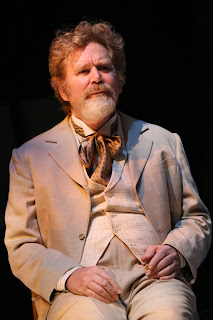You've acted in several Chekhov plays over the course of your career. Could you talk about the experience of playing Chekhov?
 |
| John Christopher Jones in THE SEAGULL at CSC, 2008. Photo: Joan Marcus |
I remember when I played Kulygin at the McCarter Theater in Lanford Wilson’s translation, that there were five places where I didn’t know how to get from sentence A to sentence B. So, I looked it up in the Russian original—I had taken Russian as a language in college, but I hadn’t really remembered too much of it so I used a dictionary—and every place where I had marked my script with an X, Lanford Wilson had either added or deleted a line of Chekhov. So, it was kind of interesting. I translated the whole part of Kulygin at McCarter. I used Lanford Wilson’s translation, I didn’t use any of my own stuff, but I did it to try to figure out, to at least give myself some ammunition to play the part. Here’s an example. I don’t know if this will translate for a newsletter but it’s kind of interesting. In the fire scene, Kulygin’s asleep and Masha enters the room and he wakes up and his line is “Milia Moya Masha. [More Russian]” which is usually translated, “My good Masha, my kind Masha, my dear Masha, my sweet Masha.” And the repetition of the “m” sound gives a clue. Interesting that it’s “nym nym nym” so I imagine him waking up at 3 or 4 in the morning, seeing his wife, and going, “nym nym nym.” It’s kind of baby talk, and I think I translated it as, “Mmmmmm my Masha. Precious, mmmyyy Masha.” So I was able to use the sound of the Russian to get a hint, a clue, as to how to play the moment, and when the show was over, I decided to translate the entire play. It took me a year. I did three drafts and I used a dictionary and the Russian text.
So would you say that your experience of playing Kulygin in that production, and your challenges of the areas that you had marked as being problematic in terms of the translation, sort of led you to start wanting to translate Chekhov yourself?
The answer is a resounding yes. The deal about translating the entire play, part of me just wanted to see if I could. I’m sort of a puzzle person, I like Scrabble and crosswords and cryptic puzzles, so translation sort of feeds the same appetite in terms of trying to come up with alternative fillers for a space. And, I just found the work very, very interesting and rewarding. When CSC was about to do THREE SISTERS, I submitted my translation for consideration, but they had already committed to doing the Paul Schmidt version, but they said, “It’s really good, your THREE SISTERS translation. How about this, what if we commission you to do THE CHERRY ORCHARD?”
You worked closely with Andrei, John and Dianne on this translation. Can you talk a little bit about that collaborative process?
 |
| Adam Driver and John Christopher Jones in THE FOREST at CSC, 2012. Photo: Joan Marcus |
Anything else you’d like to add?
Yes, there is. I was diagnosed with Parkinson’s Disease eight years ago, and thank God I’ve been able to continue my work as an actor. I’m very grateful to CSC and Brian and Dianne for the privilege and the joy of continuing to work on such great material, but particularly Dianne, for her appreciation of what I can still do. I’m still working as an actor. Another company in town that’s been very faithful to me is Theatre for a New Audience. I think I’ve done seven plays for them in the last eight years. The parts get smaller and smaller but they were still good parts: the Gravedigger in HAMLET and the Porter in MACBETH. The porter in MACBETH is the smallest part I’ve ever played, all of two pages. But everybody remembers the porter because he says, “Remember the porter.” He tells the audience, “Remember the porter!” before he leaves. So, as my acting work sort of rides off into the sunset, it’s nice to be able to connect as a translator. And in translating THE CHERRY ORCHARD, I have tried to find each character’s voice, and as a result, in a sense, I get to play all the parts.
------------------------------------------------------------------------------------------
THE CHERRY ORCHARD runs at Classic Stage Company through December 30, 2011. Click here for tickets or call 212-352-3101 / 866-811-4111.

No comments:
Post a Comment